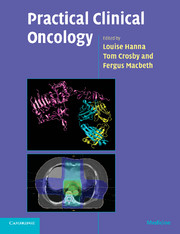Book contents
- Frontmatter
- Contents
- List of contributors
- Preface
- Acknowledgements
- Abbreviations
- 1 Practical issues in cytotoxic chemotherapy usage
- 2 Biological treatments in cancer
- 3 Hormones in cancer
- 4 Radiotherapy planning
- 5 Research in cancer
- 6 Oncological emergencies
- 7 Palliative care
- 8 Head and neck
- 9 Oesophagus
- 10 Stomach
- 11 Liver, gallbladder and biliary tract
- 12 Exocrine pancreas
- 13 Colon and rectum
- 14 Anus
- 15 Gastrointestinal stromal tumours
- 16 Breast
- 17 Kidney
- 18 Bladder
- 19 Prostate
- 20 Testis
- 21 Penis
- 22 Ovary
- 23 Body of the uterus
- 24 Cervix
- 25 Vagina
- 26 Vulva
- 27 Gestational trophoblast tumours
- 28 Lung
- 29 Mesothelioma
- 30 Soft tissue and bone tumours in adults
- 31 The lymphomas and myeloma
- 32 Central nervous system
- 33 Skin cancer other than melanoma
- 34 Melanoma
- 35 Thyroid
- 36 Neuroendocrine tumours
- 37 Cancer in children
- 38 Cancer of unknown primary
- 39 The use of radiotherapy in the treatment of benign conditions
- Multiple choice questions
- Multiple choice answers
- Index
- References
15 - Gastrointestinal stromal tumours
Published online by Cambridge University Press: 23 December 2009
- Frontmatter
- Contents
- List of contributors
- Preface
- Acknowledgements
- Abbreviations
- 1 Practical issues in cytotoxic chemotherapy usage
- 2 Biological treatments in cancer
- 3 Hormones in cancer
- 4 Radiotherapy planning
- 5 Research in cancer
- 6 Oncological emergencies
- 7 Palliative care
- 8 Head and neck
- 9 Oesophagus
- 10 Stomach
- 11 Liver, gallbladder and biliary tract
- 12 Exocrine pancreas
- 13 Colon and rectum
- 14 Anus
- 15 Gastrointestinal stromal tumours
- 16 Breast
- 17 Kidney
- 18 Bladder
- 19 Prostate
- 20 Testis
- 21 Penis
- 22 Ovary
- 23 Body of the uterus
- 24 Cervix
- 25 Vagina
- 26 Vulva
- 27 Gestational trophoblast tumours
- 28 Lung
- 29 Mesothelioma
- 30 Soft tissue and bone tumours in adults
- 31 The lymphomas and myeloma
- 32 Central nervous system
- 33 Skin cancer other than melanoma
- 34 Melanoma
- 35 Thyroid
- 36 Neuroendocrine tumours
- 37 Cancer in children
- 38 Cancer of unknown primary
- 39 The use of radiotherapy in the treatment of benign conditions
- Multiple choice questions
- Multiple choice answers
- Index
- References
Summary
Introduction
Gastrointestinal stromal tumours (GISTs) are rare mesenchymal tumours that can occur anywhere in the gastrointestinal tract. GISTs have been difficult to diagnose in the past which, along with their rarity, makes their incidence hard to estimate. In the past, there was also very little to offer GIST patients in the way of treatment, and the prognosis was extremely poor. However, recent understanding of the molecular pathology involved in GISTs has made diagnosis more accurate and effective treatments are now available with molecular-targeted therapy. As research continues, it is likely that more molecular-targeted therapies will become available for this condition.
GISTs originate from the interstitial cells of Cajal (ICC) – pacemaker cells that control gut motility. The tumours are diagnosed by a combination of morphological features and immunohistochemistry staining. Oncogenesis appears to be related to dysregulation of the proto-oncogene KIT, a growth-factor receptor tyrosine kinase (de Silva and Reid, 2003).
Types of tumour
Of gastrointestinal mesenchymal tumours, GIST is the most common. The gastrointestinal autonomic tumour (GANT) is a phenotypic variant of GIST with neuroendocrine differentiation. True smooth muscle tumours also occur, but Schwann cell tumours are rare.
Of GISTs, 60 to 70% express CD34, suggesting GISTs are an entity distinct from smooth muscle tumours.
The majority (95%) of GISTs stain positively with CD117, an antibody that recognises an extracellular epitope of KIT (Corless et al., 2004). The most common mutation, which is found in 70% of GISTs, is in exon 11 of KIT.
- Type
- Chapter
- Information
- Practical Clinical Oncology , pp. 183 - 189Publisher: Cambridge University PressPrint publication year: 2008



